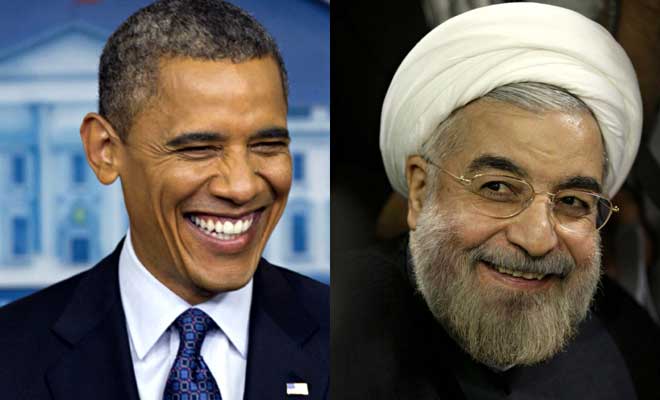Charles Recknagel, with a contribution from EA, writes for Radio Free Europe/Radio Liberty:
Syria, Iraq, Afghanistan, nuclear proliferation — all are crises in which the West and Iran have high stakes.
But could the two sides — particularly Washington and Tehran — ever reduce tensions sufficiently to become partners in global peacemaking, or even achieve a rapprochement?
The question arises again after Iran and six world powers this week set a benchmark for cooperation by agreeing to start implementing their six-month nuclear deal on January 20.
On both sides, failure to observe commitments could easily scuttle hopes the interim deal will lead to a subsequent comprehensive solution to the Iranian nuclear crisis. But for now, the accord appears to have sidelined critics in both Washington and Tehran sufficiently to open the way for further engagement, even beyond the nuclear issue.
“What is happening between the United States and the Iranians is that they are going through a long-term process of rebuilding trust that has been shattered over 35 years, since the [Islamic] Revolution,” says Ghanem Nuseibeh, founder of the London-based political-risk-analysis group Cornerstone Global Associates.
“So, things will not change overnight. But they are certainly moving in the direction where there will be a gradual buildup of trust, not only on the Iranian nuclear issue, because that would be the gate toward anything beyond that, but also on other regional issues of mutual interest. It is not going to be quick, but it will eventually be an opportunity for longer-term collaboration.”
Another area where engagement already is being explored is the Syrian crisis. U.S. Secretary of State John Kerry met on January 13 with his Russian counterpart, Sergei Lavrov, in Paris to discuss ways Tehran might take part in the Syrian peace conference set for January 22 in Montreux, Switzerland.
***
The meeting appeared to end inconclusively, with Kerry restating Washington’s position that Tehran could be a formal participant only if it agrees to the goal of creating a transitional government. That is a condition Iran has previously rejected, saying it amounts to accepting that its ally, Syrian President Bashar al-Assad, step down. However, there remains the possibility that Iran could yet attend the meeting in some informal capacity — especially as Lavrov and the UN’s envoy for Syria, Lakhdar Brahimi, used the January 13 meeting to call again for Iran’s involvement.
Nonetheless, if engagement with Iran seems to be something increasingly on the international agenda, many analysts say it would be a mistake to assume that either Washington or Tehran is currently envisioning any possibility of a detente.
Nuseibeh says that Iran’s recent willingness to engage is due to multiple factors, including pressure from economic sanctions to come to the negotiating table over its nuclear program and President Rohani’s own position that Tehran can win more through negotiation than confrontation.
But Rohani, a cleric and regime insider, has never spoken of directly improving relations with Washington and does not have the power to do so. That lies with Iran’s Supreme Leader Ayatollah Ali Khamenei.
Similarly, U.S. President Barack Obama has never spoken of a detente and is fighting a rearguard action in Congress against opponents who want to tighten sanctions further on Tehran.
There are other reasons that would make it difficult for Washington and Tehran to quickly achieve a rapprochement even if they desired it.
***
Scott Lucas, editor of EA Worldview, a specialist website on Iran and the Mideast, notes that, in some crises, Iran and the United States are the principal players and can fully determine the outcomes. But in others, they cannot because they involve other players who further complicate their relations.
One example is the Syrian crisis, which includes a fierce regional rivalry between Iran and Saudi Arabia, a U.S. ally:
“[Iranian President Hassan] Rohani’s government entered office last summer with the hope that it could improve relations with Saudi Arabia,” Lucas says. “It talked about its own engagement with Riyadh, but the Syria issue has very much got in the way of that because the bulk of opinion within the [Iranian] regime — the supreme leader, MPs, leading clerics, as well as much of the country’s media — is now so hostile to Saudi Arabia, accusing it of supporting terrorist attacks [in Syria and Lebanon] that there really is no political space for Iran to look for any accord with Saudi Arabia. And as long as that does not occur you have a complication.”
According to Lucas, the crises in Iraq and Afghanistan — where Washington and Tehran are already nominally on the same side in supporting the countries’ governments — present even more difficulties.
“You can’t just simply see Iraq or Afghanistan as being governments answering the call of either Tehran or Washington — that the problems in Iraq are simply because of Iran pulling the strings of [Prime Minster Nuri] al-Maliki’s government,” he says. “The problems in Iraq are due to the al-Maliki government itself and its problems in how it has dealt with the Sunni minority. I think the same could be said in Afghanistan, in that the Karzai government will continue to assert its own authority in terms of how it deals with its population. And that means that both Iran and Washington have issues in terms of how they deal with Karzai, as well as to whether they wind up on the same side.”
Still, few observers would discount the importance of the level of cooperation Washington and Tehran have managed to achieve thus far on the nuclear crisis. And few would dispute the fact that the ability to cooperate can grow with practice.
As with any journey, the process of turning enmity into partnership starts with small steps. The success or failure of the current efforts will make it clearer in the coming months whether more, or little else, lies ahead.

